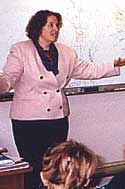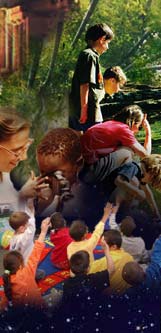 |
 |
PROFESSIONAL
DEVELOPMENT

Defining
Your Own Educational Philosophy
DESCRIPTION
This 10-hour course (5 sessions, 2 hours each) is designed to enable
educators, administrators, parents, and other members of the school
community or local councils to define their own philosophical beliefs
in clear and coherent terms.
Participants will discuss the coherence (or lack
thereof) between their educational philosophies and curricula, teaching
practices, and evaluation procedures. Participants will also work
in small groups to define a common philosophy that represents a
consensus. Principles of socratic inquiry will guide participants
towards the construction of solid educational philosophies that
stand firmly as the foundation for pedagogical decisions and practices
in their own schools and classrooms. A written personal philosophy
as well as a group philosophy will be created.
Too many of our schools and classrooms today are still built on
outmoded factory models of education designed to produce similar
products based on an input of homogeneous raw materials. As we approach
the 21st century, however, we realize that new technology is forcing
us to think and act in ways never experienced before, that the nature
of jobs is changing, and that the problems which we face will require
an ever-increasing understanding of multiple belief systems, cultures,
and reasons for our behavior. By learning to articulate one's own
set of beliefs about how children should learn in both formal and
informal settings, we advance the process of communication necessary
for building a successful and peaceful society.
Four basic educational philosophies are examined: humanistic, social
reconstructionist, mechanistic, and academic. As these are studied
and experienced firsthand in classroom demonstrations reflecting
each philosophy, participants will learn to define their own beliefs,
and understand in greater depth decisions regarding choices of instructional
settings, materials, learning activities, grouping of students,
assessment timing and procedures, etc. Participants must be open
to new ideas, and they must identify the sources of conflicting
opinions, sometimes letting go of ingrained practices and/or beliefs,
in order to begin constructing a coherent educational system in
which to better teach, to learn, and to raise children.
Excerpted readings:
Gutek, G. (1997). Historical and Philosophical Foundations of Education
(2nd. ed.) NJ: Merrill.
McNeil, J.D. (1990). Curriculum. A Comprehensive Introduction
Articulating Educational Philosophy
Course Outline
Session 1:
* Opening Assignment: Write down your beliefs
about how you think people should be educated.
* Opening discussion about what happens when
one's philosophy or beliefs are inconsistent with one's actions.
Session 2:
* Demonstrations of philosophies
* Debriefings.
Session 3:
* Demonstrations of philosophies
* Debriefings.
Session 4:
* Articulating individual philosophies.
* How to take the beliefs you have and mold them
into a coherent philosophy.
* One-on-one debriefings.
Session 5
* Articulating a group philosophy.
* Managing the multiple belief systems of a school
or community, coming to consensus, writing a coherent educational
philosophy that addresses the needs of the students.

CyberEthics Project
|
 |

